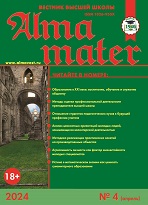UDC 304:614-053
https://doi.org/10.20339/AM.07-22.029
Filipp Yu. Kushnarev, Cand. Sc. (Politics), Assistant Professor, Department of Social Policy at Yaroslavl State University named after P.G. Demidov, e-mail: kushnarevcustoms@mail.ru
The article analyzes students’ ideas about the sports environment of the city and their attitude to a healthy lifestyle. The author conducted a sociological study in which students of leading universities of Yaroslavl were interviewed. It was found that a significant number of young men and most girls from families who belong to highly resource groups regularly attend the gym (fitness, aerobics) and swimming pool. In addition, it was revealed that, in general, boys, regardless of the type of families, are more involved in sports than girls. It has been established that for students from families that belong to highly resource groups, the main reasons for which students observe the daily routine and are physically active are associated with the attitudes received from their parents. For male students from families that belong to medium and low resource groups, the main motive for going in for sports are sports victories, as one of the ways of self-affirmation. New acquaintances are more important for girls than for boys when playing sports. It was revealed that the more affluent the respondent's family, the more infrastructurally developed micro district he lives in, and the more he is satisfied with the conditions for physical culture and sports. It is also established that regardless of the material well-being of their families (parents), financial support from any level of government motivates them to play sports. The study is of interest to state and municipal authorities involved in culture, sports and youth policy, as the opinion of students is presented depending on the financial situation of the respondents' families, gender characteristics, age and taking into account the level of education of parents. The activities aimed at improving the sports infrastructure of the Yaroslavl city and promoting a healthy lifestyle among students is proposed.
Key words and phrases: healthy lifestyle, active lifestyle, stress, health-oriented space, urban space.
References
1. Talanov, S.L. Transformation of values of student youth under conditions of dynamic social changes. Alma mater (Vestnik vysshei shkoly). 2020. No. 2. P. 32–41. DOI 10.20339/AM.02-20.032
2. Su Hyun, Park, Nicholas A., Petrunoff, Nan Xin, Wang, Rob M., van Dam, Angelia, Sia, Chuen Seng, Tan, Falk, Müller-Riemenschneider. Daily park use, physical activity, and psychological stress: A study using smartphone-based ecological momentary assessment amongst a multi-ethnic Asian cohort. Mental Health and Physical Activity. 2022. Vol. 22. URL: https://doi.org/10.1016/j.mhpa.2022.100440
3. Sallis J.F. , Cerin E., et al. Built environment, physical activity, and obesity: Findings from the International Physical Activity and Environment Network (IPEN) adult study. Annual Reviews Public Health. 2020. Vol. 2 (41). P. 119–139. DOI: 10.1146/annurev-publhealth-040218-043657
4. Venter, Z.S., Barton, D.N., Gundersen, V., Figari, H., Nowell, M. Urban nature in a time of crisis: Recreational use of green space increases during the COVID-19 outbreak in Oslo, Norway. Environmental Research Letters. 2020. Vol. 15, No. 10. Art. 104075.
5. Hoover, F.-A., Lim, T.C. Examining privilege and power in US urban parks and open space during the double crises of antiblack racism and COVID-19. Socio-Ecological Practice Research. 2021. Vol. 3. P. 55–70.
6. Davletova, N.H., Tafeeva, E.A. Influence of natural and climatic conditions on air quality and health risks in the areas of outdoor sports facilities (on the example of Kazan). Health Risk Analysis. 2018. No. 1. P. 39–46.
7. Baburkin, S.A., Talanov, S.L., Aleshin, V.V. Education-related (Study-related) Migration of the Graduates of the Secondary School: Causes and Motives (the Case of Yaroslavl region). Alma mater (Vestnik vysshei shkoly). 2021. No. 8. P. 24–35. DOI 10.20339/AM.08-21.024
8. Kushnarev, F.Yu., Zagrebin, V.V. Attitude of young professionals to professional work: the view of Yaroslavl university graduates. Social and Humanitarian Knowledge. 2019. Vol. 5. No. 1 (17). P. 44–51.
9. Smirnova, E.A., Berezin, D.T. Improvement of labour incentive system as a condition for improving the level of personnel management of the organization. In: Economic potential of students in the regional economy. Materials of the international scientific-practical conference. L.G. Batrakova, N.L. Budakhina (eds.). Yaroslavl, 2020. P. 199–203.
10. Bourdieu, P. Distinction: A social critique of the judgment of taste. N.Y.: Routledge,1989.
11. Cockerham, W. Health and Social Change in Russia and Eastern Europe. London: Routledge, 1998.
12. Beck, W. Risk Society. On the way to another modernity. Moscow: Progress-Tradition, 2000.











.png)






